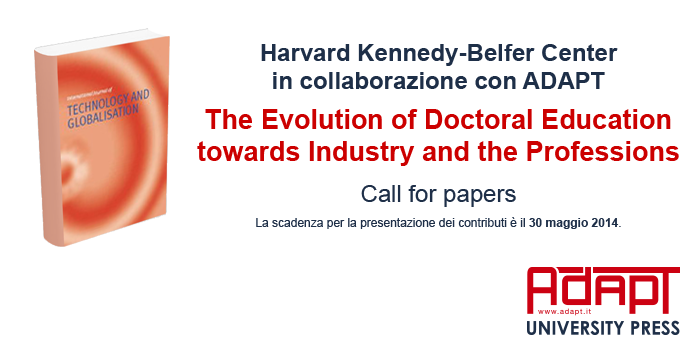The Evolution of Doctoral Education towards Industry and the Professions: call for papers
| di ADAPT

L’obiettivo del Call for papers è l’analisi comparata del fenomeno dei dottorati industriali e professionali o più in generale, di tutte quelle esperienze di percorsi innovativi esistenti a livello internazionale che prevedono una maggiore interazione tra enti di ricerca, università, imprese e mercato del lavoro nel suo complesso.
I paper selezionati verranno pubblicati in un numero speciale della rivista International Journal of Technology and Globalisation.
La scadenza per la presentazione dei contributi è il 30 giugno 2014.
[hr style=”single”]
Guest Editor:
Michele Tiraboschi, University of Modena and Reggio Emilia, Italy
Recent social, economic and cultural changes brought about by the knowledge economy have called into question the traditional role and function of doctoral education.
On the one hand , there is the need to promote a closer cooperation between universities and businesses to foster development and business innovation. In this respect, many educational institutions are unprepared for this challenge, as university research has long evolved in isolation from socio-economic development. On the other hand, these changes have raised a number of issues with regard to the employability of doctorate graduates inside and outside of academia, as they are increasingly exposed to the risk of a mismatch between their educational qualifications and the skills required by the labour market.
This situation has urged educational institutions to progressively gear doctoral education curricula to better meet the needs of the labour market. These efforts are aimed at preparing youth for industry-oriented or professional careers outside of academia, with a view to increasing employability and reducing unemployment levels among graduates, while promoting cooperation between businesses and universities, increasingly recognised as a crucial lever for competitiveness.
These trends have led to the emergence of a whole series of doctoral programmes which combine, to different extents and in different forms, academic research and labour market experience.
These kinds of programmes differ extensively from country to country, ranging from professional doctorates to industrial PhDs. A whole array of “hybrid” programmes that do not fall within a specific category have been emerging in recent years all over the world as a result of most recent trends in higher education.
In the light of the legal changes occurring in many countries to foster this new type of doctoral curricula, it is now all the more important to devote special attention to the issue. The evolution of doctoral education raises a number of questions when it comes to understanding the quality and effectiveness of higher education.
It is in this light that the Harvard Kennedy Belfer Center for Science and International Affairs Science, Technology and Globalization Project and ADAPT (Association for International and Comparative Studies in the Field of Labour Law and Industrial Relations, founded in 2000 by professor Marco Biagi) have decided to devote a special issue to this highly topical subject, with a view to collecting international and comparative studies and analyses as well as identifying and disseminating best practice existing all over the world and which could be further implemented across countries.
The editors and guest editors solicit original articles which discuss the above-mentioned issues. Articles’ subject matter should examine the issues at hand from an international and interdisciplinary perspective.
Authors of some of the papers published in the special issue may be invited to present their papers – provided they have been significantly adapted for a conference audience and their provenance is announced – at the V Edition of the ADAPT International Conference on Productivity, Investment in Human Capital and the Challenge of Youth Employment.
Subject Coverage
Suitable topics include, but are not limited to, the following:
Cooperation between businesses, higher educationand research institutions as a lever of social and economic development at the local level and as an innovation factor for universities (in terms of teaching, research and placement)
Innovative doctoral programmes aimed at increasing the employability of doctorate graduates developed in cooperation between universities and businesses: legal frameworks, actors involved, functioning and curricula
Models, methods and tools for the development of soft skills as well as technical and professional skills in doctoral programmes
Becoming a researcher: good practice in the field of training, and doctorates’ employability inside and outside academia
Professional careers of doctorate graduates: analysis of career paths and impact of doctoral education on employment outcomes
Notes for Prospective Authors
Submitted papers should not have been previously published nor be currently under consideration for publication elsewhere. (N.B. Conference papers may only be submitted if the paper has been completely re-written and if appropriate written permissions have been obtained from any copyright holders of the original paper).
All papers are refereed through a peer review process.
All papers must be submitted online. To submit a paper, please read our Submitting articles page.
All submissions should include an abstract of not more than 250 words, to be emailed to the Guest Editor, Michele Tiraboschi, at tiraboschi@unimore.it. Abstracts should include the author’s name, title, qualifications, institutional affiliation and email addresse. If there are multiple authors, the name and contact details of the corresponding author(s) should be sent.
Important Dates
Submission deadline: 30 May, 2014
Condividi su:
